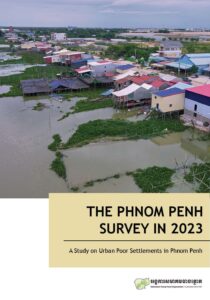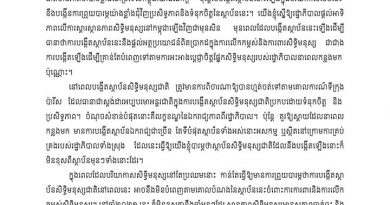 This report is a continuation of STT’s previous study on the state of Phnom Penh’s urban poor settlements published in 2017. It aims to update data on urban poor settlements, such as information on evictions, land titling, and socio-economic conditions. The survey was conducted in Phnom Penh from July 2022 to December of 2022 followed by data analysis and report formatting from January 2023 onwards. The report includes 191 settlements that are considered urban poor in the final analysis. These settlements represent 19,539 families, or 89,879 people, which equates to 3.94% of the total population of Phnom Penh. STT also looked at secondary data, including NGO reports, government reports, academic papers, media articles and other open-source data. The report contains key findings:
This report is a continuation of STT’s previous study on the state of Phnom Penh’s urban poor settlements published in 2017. It aims to update data on urban poor settlements, such as information on evictions, land titling, and socio-economic conditions. The survey was conducted in Phnom Penh from July 2022 to December of 2022 followed by data analysis and report formatting from January 2023 onwards. The report includes 191 settlements that are considered urban poor in the final analysis. These settlements represent 19,539 families, or 89,879 people, which equates to 3.94% of the total population of Phnom Penh. STT also looked at secondary data, including NGO reports, government reports, academic papers, media articles and other open-source data. The report contains key findings:
- The number of urban poor settlements in the city has been declining from 277 in 2017 to 191 in 2023, with some locations being dissolved due to the conditions, they are no longer classified as urban poor settlements, while others have gone entirely, often due to eviction. Meanwhile, there is also an increase in communities receiving land titles. Namely, 19 communities claimed to have received land titles since 2017.
- A third of 191 settlements are likely to be located on state land while nearly two thirds of all settlements do not have written documentation indicating the status of the land they live on. This means that those settlements are facing risks of eviction and forced eviction because of a failure of the state in providing clarity and security of tenure to these settlements.
- Over a quarter of the 191 settlements are claiming to being pressured into forced evictions. At least 9 settlements were also forcibly evicted during Covid-19. A woman living in Banteay Sloek community behind Sovanna Supermarket and was forcibly evicted due to 7NG in Kandal Province on 11 July 2020. She said, “it is a cold-blooded eviction.” After the authorities came to demolish the community’s homes, they claimed that the community had already agreed to the relocation.
- Access to drainage and ID Poor is still lacking in many settlements; however, connection to government public services such water, electricity and waste collection have improved since 2017.
- Finally, 26 of the 191 urban poor settlements are in debt. Some reported selling their homes due to loans. This is something that STT and other human rights organizations believe may have been done reluctantly. Falling into such debt traps has exposed settlement members to a variety of other potential human rights abuses such as land loss, homelessness, forced migration, debt bondage, child labor, and having less access to other basic needs. ” I can’t afford to pay until we sell the house,” said one interviewer.
You can find out more about our report, which can be accessed at
You can download the report as a PDF file here! Khmer – English
For further information please contact:
Mr. Soeung Saran, Executive Director of Sahmakum Teang Tnaut.
Signal: 089 666 013
Email: director@teangtnaut.org
Mr. Ronan Kemp, Advisor at Sahmakum Teang Tnaut.
Signal: 081 262 799
Email: advisor@teantnaut.org




